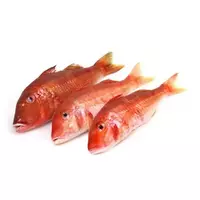Fish drum (sultanka)

The fish of the drum (sultanka) got its original name thanks to the Turkish language. Turkish seafarers called the fish barbunya, which means "big beard. " The mullet fish or Common Sultanka Mullus barbatus is a member of the Barubulov family. The fish of the drum (sultanka) lives in seawater at shallow depths. The sultanka is distributed near the east coast of Great Britain, Scandinavia, off the Canary and Azores Islands.
In addition, drum fish (sultanka) can be found in the Azov, Mediterranean and Black Seas. The taste of drum fish was appreciated back in the days of Ancient Rome. Usually, the average sultanka individual in modern seas barely reaches 20 cm in length. In ancient times in the Black and Mediterranean Seas there were larger individuals of drum fish. According to legends, Roman foodies were ready to give one kilogram of silver for one kilogram of fish.
This fact speaks of the exclusivity and features of the sultanka fish. Interestingly, before preparing fish dishes, Roman chefs brought the sultanka in special dishes for guests to see. The newly caught drum changes its color from silver to carmine color right before our eyes. This spectacle fascinated the Romans, and then the taste of the meat of the sultanka made you love the exquisite and tender fish delicacy once and for all.
However, mullet fish is distinguished not only by its excellent taste, but also by its vitamin-mineral composition. Like most fish, sultanka belongs to low-calorie protein foods. Natural proteins that are contained in the drum perfectly saturate the human body, and then are just as well and easily absorbed. In addition, the drum is rich in the content of such useful natural minerals as iron, phosphorus, magnesium, as well as vitamin B.
Nutritionists claim that the fish of the drum has special abilities to restore the strength of the human body. In cooking, drum (sultanka) has been used since ancient times, so enough recipes have accumulated with the participation of the meat of this fish. It is believed that it is difficult to spoil the meat of the sultanka. It is best to use fresh mullet meat to make ear or fish soups.
However, the drum is distinguished by its excellent taste in a toasted, as well as baked, dried or dried form. In addition to drums, fish livers are used in cooking, which are enriched with naturally occurring polyunsaturated fatty acids. In Mediterranean cuisine, small-sized drum varieties are most often used. Such neat and beautiful fish are considered a delicatessen product, which is on the menu of most restaurants in the Mediterranean region.
It is believed that nothing tastes better than a drum baked in white wine. The fish for this dish is baked whole. To begin with, the mullet is fried in breadcrumbs in melted butter. Sultanka has a small amount of fish oil, which gives the dishes from this fish a special taste. The combination of wine, spices and spices, grape leaves, ghee and fish of a tumbler (sultanka) can conquer even the most biased foodie and connoisseur of fish cuisine.
fish drum (sultanka) 117 kCal
The energy value of fish shambles (sultanka) (Ratio of proteins, fats, carbohydrates - ju):
Proteins: 19.35 g (~ 77 kCal)
Fats: 3.79 g (~ 34 kCal)
Carbohydrates: 0 g (~ 0 kCal)
Energy ratio (b | y): 66% | 29% | 0%
 Español
Español Français
Français Português
Português Русский
Русский 简体中文
简体中文 繁體中文
繁體中文 日本語
日本語 한국어
한국어 العربية
العربية Türkçe
Türkçe Қазақ
Қазақ Deutsch
Deutsch Italiano
Italiano Українська
Українська
